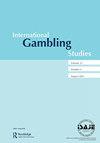The joint influence of regulatory and social cues on consumer choice of gambling websites: preliminary evidence from a discrete choice experiment
IF 1.8
3区 心理学
Q2 SUBSTANCE ABUSE
引用次数: 1
Abstract
ABSTRACT Authorities regulate online transactions to protect consumers from unintended negative consequences. Regulatory cues (e.g. certifications) enable consumers to identify formally approved online gambling offers where unauthorized products are available and blocking access is difficult. However, consumers who gamble online are also influenced by peer endorsement and frequently search for peer usage information to make decisions. This study investigates the interaction of regulatory and social cues and shows that these can be either complementary or substitutionary from a consumer perspective. Australian undergraduate students (N= 195, 72.3% female) indicated preferences toward fictitious online gambling websites in a discrete choice experiment involving active searching for cues. The impact of regulatory cues on decision-making increased when social cues indicated high quantities of website users, and when respondents lacked general trust toward gambling websites, but decreased when user social proximity was signaled. Our preliminary findings suggest regulatory cues should be prominent, and policies could aim to heighten mistrust in unauthorized sites. This study provides a foundation for further research designed to inform consumer protection agencies about how to influence consumer choice of online gambling websites in settings where regulatory and social cues may compete.监管和社会线索对赌博网站消费者选择的共同影响:来自离散选择实验的初步证据
摘要当局监管在线交易,以保护消费者免受意外的负面后果。监管线索(如认证)使消费者能够识别正式批准的在线赌博优惠,在这些优惠中可以获得未经授权的产品,并且很难阻止访问。然而,在线赌博的消费者也会受到同行背书的影响,经常搜索同行使用信息来做出决定。这项研究调查了监管和社会线索的相互作用,并表明从消费者的角度来看,这些线索可以是互补的,也可以是替代的。在一项涉及主动搜索线索的离散选择实验中,澳大利亚本科生(N=195,72.3%的女性)表示更喜欢虚构的在线赌博网站。当社交线索表明有大量网站用户时,以及当受访者对赌博网站缺乏普遍信任时,监管线索对决策的影响会增加,但当用户社交接近时,监管提示的影响会减少。我们的初步调查结果表明,监管线索应该突出,政策可能旨在加剧对未经授权网站的不信任。这项研究为进一步的研究奠定了基础,旨在让消费者保护机构了解如何在监管和社会线索可能存在竞争的环境中影响消费者对在线赌博网站的选择。
本文章由计算机程序翻译,如有差异,请以英文原文为准。
求助全文
约1分钟内获得全文
求助全文

 求助内容:
求助内容: 应助结果提醒方式:
应助结果提醒方式:


